- Home
- Jodi Picoult
The Jodi Picoult Collection #3 Page 3
The Jodi Picoult Collection #3 Read online
Page 3
Fitz had listened to me speak a truth we’d taken great pains never to utter out loud, plus a newer, magnificent, frightening one. I can’t do this alone, I told him.
He had looked at my belly, still flat. You aren’t.
There was no denying Eric’s magnetism, but that afternoon I realized that, united, Fitz and I were a force to be reckoned with as well. And when I left his apartment armed with the knowledge of what I was going to have to say to Eric, I remembered what I had written down during that backlit summer when I was trying to guess the rest of my life. I’d been embarrassed setting the words to paper, had folded it three times so Fitz and Eric wouldn’t see. Me—a tomboy who spent hours in the company of boys pretending to be a swashbuckling privateer, or an archaeologist searching for relics, a girl who had been the damsel in distress only once, and even then had rescued herself—I had written only a single wild wish. One day, I’d written, I will be a mother.
* * *
As one of Wexton’s three attorneys, Eric does real estate transfers and wills and the occasional divorce, but he’s done a little trial work, too—representing defendants charged with DUI and petty thefts. He usually wins, which is no surprise to me. After all, more than once I have been a jury of one, and I’ve always managed to be persuaded.
Case in point: my wedding. I was perfectly happy to sign a marriage certificate at the courthouse. But then Eric suggested that a big party wasn’t such a bad idea, and before I knew what had happened, I was buried in a pile of brochures for reception venues, and band tapes, and price lists from florists.
I’m sitting on the living room floor after dinner, swatches of fabric covering my legs like a patchwork quilt. “Who cares whether the napkins are blue or teal?” I complain. “Isn’t teal really just blue on steroids, anyway?”
I hand him a stack of photo albums; we are supposed to find ten of Eric and ten of me as an introductory montage to the wedding video. He cracks the first one open, and there’s a picture of Eric and Fitz and me rolled fat as sausages in our snowsuits, peeking out from the entrance of a homemade igloo. I’m between the two boys; it’s like that in most of the photos.
“Look at my hair,” Eric laughs. “I look like Dorothy Hamill.”
“No, I look like Dorothy Hamill. You look like a portobello mushroom.”
In the next two albums I pick up, I am older. There are fewer pictures of us as a trio, and more of Eric and me, with Fitz sprinkled in. Our senior prom picture: Eric and I, and then Fitz in his own snapshot with a girl whose name I can’t recall.
One night when we were fifteen we told our parents we were going on a school-sponsored overnight and instead climbed to the top of Dartmouth’s Baker Library bell tower to watch a meteor shower. We drank peach schnapps stolen from Eric’s parents’ liquor cabinet and watched the stars play tag with the moon. Fitz fell asleep holding the bottle and Eric and I waited for the cursive of comets. Did you see that one? Eric asked. When I couldn’t find the falling star, he took my hand and guided my finger. And then he just kept holding on.
By the time we climbed down at 4:30 A.M., I had had my first kiss, and it wasn’t the three of us anymore.
Just then my father comes into the room. “I’m headed upstairs to watch Leno,” he says. “Lock up, okay?”
I glance up. “Where are my baby pictures?”
“In the albums.”
“No . . . these only go back to when I’m four or five.” I sit up. “It would be nice to have your wedding picture, too, for the video.”
I have the only photo of my mother that is on display in this house. She is on the cusp of smiling, and you cannot look at it without wondering who made her happy just then, and how.
My father looks down at the ground, and shakes his head a little. “Well, I knew it was going to happen sometime. Come on, then.”
Eric and I follow him to his bedroom and sit down on the double bed, on the side where he doesn’t sleep. From the closet, my father takes down a tin with a Pepsi-Cola logo stamped onto the front. He dumps the contents onto the covers between Eric and me—dozens of photographs of my mother, draped in peasant skirts and gauze blouses, her black hair hanging down her back like a river. A wedding portrait: my mother in a belled white dress; my father trussed in his tuxedo, looking like he might bolt at any second. Photos of me, wrapped tight as a croissant, awkwardly balanced in my mother’s arms. And one of my mother and father on an ugly green couch with me between them, a bridge made of dimpled flesh, of blended blood.
It is like visiting another planet when you only have one roll of film to record it, like coming to a banquet after a hunger strike—there is so much here that I have to consciously keep myself from racing through, before it all disappears. My face gets hot, as if I’ve been slapped. “Why were you hiding these?”
He takes one photograph out of my hand and stares at it long enough for me to believe he has completely forgotten that Eric and I are in the room. “I tried keeping a few of the pictures out,” my father explains, “but you kept asking when she was coming home. And I’d pass them, and stop, and lose ten minutes or a half hour or a half day. I didn’t hide them because I didn’t want to look at them, Delia. I hid them because that was all I wanted to do.” He puts the wedding picture back in the tin and scatters the rest on top. “You can have them,” my father tells me. “You can have them all.”
He leaves us sitting in the near dark in his bedroom. Eric touches the photograph on the top as if it is as delicate as milkweed. “That,” he says quietly. “That’s what I want with you.”
* * *
It’s the ones I don’t find that stay with me. The teenage boy who jumped off the Fairlee-Orford train bridge into the Connecticut River one frigid March; the mother from North Conway who vanished with a pot still boiling on the stove and a toddler in the playpen; the baby snatched out of a car in the Strafford post office parking lot while her sitter was inside dropping off a large package. Sometimes they stand behind me while I’m brushing my teeth; sometimes they’re the last thing I see before I go to sleep; sometimes, like now, they leave me restless in the middle of the night.
There is a thick fog tonight, but Greta and I have trained enough in this patch of land to know our way by heart. I sit down on a mossy log while Greta sniffs around the periphery. Above me, something dangles from a branch, full and round and yellow.
I am little, and he has just finished planting a lemon tree in our backyard. I am dancing around it. I want to make lemonade, but there isn’t any fruit because the tree is just a baby. How long will it take to grow one? I ask. A while, he tells me. I sit myself down in front of it to watch. I’ll wait. He comes over and takes my hand. Come on, grilla, he says. If we’re going to sit here that long, we’d better get something to eat.
There are some dreams that get stuck between your teeth when you sleep, so that when you open your mouth to yawn awake they fly right out of you. But this feels too real. This feels like it has actually happened.
I’ve lived in New Hampshire my whole life. No citrus tree could bear a climate like ours, where we have not only White Christmases but also White Halloweens. I pull down the yellow ball: a crumbling sphere made of birdseed and suet.
What does grilla mean?
* * *
I am still thinking about this the next morning after taking Sophie to school, and spend an extra ten minutes walking around, from the painting easel to the blocks to the bubble station, to make up for my shoddy behavior yesterday. I’ve planned on doing a training run with Greta that morning, but I’m sidetracked by the sight of my father’s wallet on the floor of my Expedition. He’d taken it out a few nights ago to fill the tank with gas; the least I can do is swing by the senior center to give it back.
I pull into the parking lot and open the back hatch. “Stay,” I tell Greta, who whumps her tail twice. She has to share her seat with emergency rescue equipment, a large cooler of water, and several different harnesses and leashes.
Suddenly I
feel a prickle on my wrist; something has crawled onto my arm. My heart kicks itself into overdrive and my throat pinches tight, as it always does at the thought of a spider or a tick or any other creepy-crawly thing. I manage to strip away my jacket, sweat cooling on my body as I wonder how close the spider has landed near my boots.
It’s a groundless phobia. I have climbed out on mountain ledges in pursuit of missing people; I have faced down criminals with guns; but put me in the room with the tiniest arachnid and I just may pass out.
The whole way into the senior center, I take deep breaths. I find my father standing on the sidelines, watching Yoga Tuesday happen in the function room. “Hey,” he whispers, so as not to disturb the seniors doing sun salutations. “What are you doing here?”
I fish his wallet out of my pocket. “Thought you might be missing this.”
“So that’s where it went,” he says. “There are so many perks to having a daughter who does search and rescue.”
“I found it the old-fashioned way,” I tell him. “By accident.”
He starts moving down the hall. “Well, I knew it would turn up eventually,” he says. “Everything always does. You have time for a cup of coffee?”
“Not really,” I say, but I follow him to the little kitchenette anyway and let him pour me a mug, then trail him into his office. When I was a little girl, he’d bring me here and keep me entertained while he was on the phone by doing sleight-of-hand with binder clips and handkerchiefs. I pick up a paperweight on his desk. It is a rock painted to look like a ladybug, a gift I made for him when I was about Sophie’s age. “You could probably get rid of this, you know.”
“But it’s my favorite.” He takes it out of my hand, puts it back in the center of his desk.
“Dad?” I ask. “Did we ever plant a lemon tree?”
“A what?” Before I can repeat my question he squints at me, then frowns and summons me closer. “Hang on. You’ve got something sticking out of . . . no, lower . . . let me.” I lean forward, and he cups his hand around the back of my neck. “The Amazing Cordelia,” he says, just like when we did our magic act. Then, from behind my ear, he pulls a strand of pearls.
“They were hers,” my father says, and he guides me to the mirror that hangs on the back of his office door. I have a vague recollection of the wedding photo from last night. He fastens the clasp behind me, so that we are both looking in the mirror, seeing someone who isn’t there.
* * *
The offices of the New Hampshire Gazette are in Manchester, but Fitz does most of his work from the office he’s fixed up in the second bedroom of his apartment in Wexton. He lives over a pizza place, and the smell of marinara sauce comes through the forced-hot-air ducts. Greta’s toenails click up the linoleum stairs, and she sits down outside his apartment, in front of a life-size cardboard cutout of Chewbacca. Hanging on a hook on the back is his key; I use it to let myself inside.
I navigate through the ocean of clothes he’s left discarded on the floor and the stacks of books that seem to reproduce like rabbits. Fitz is sitting in front of his computer. “Hey,” I say. “You promised to lay a trail for us.”
The dog bounds into the office and nearly climbs up onto Fitz’s lap. He rubs her hard behind the ears, and she snuggles closer to him, knocking several photos off his desk.
I bend down to pick them up. One is of a man with a hole in the middle of his head, in which he has stuck a lit candle. The second picture is of a grinning boy with double pupils dancing in each of his eyes. I hand the snapshots back to Fitz. “Relatives?”
“The Gazette’s paying me to do an article on the Strange But True.” He holds up the picture of the man with the votive in his skull. “This amazingly resourceful fellow apparently used to give tours around town at night. And I got to read a whole 1911 medical treatise from a doctor who had an eleven-year-old patient with a molar growing out of the bottom of his foot.”
“Oh, come on,” I say. “Everyone’s got something that’s strange about them. Like the way Eric can fold his tongue into a clover, and that disgusting thing you do with your eyes.”
“You mean this?” he says, but I turn away before I have to watch. “Or how you go ballistic if there’s a spider web within a mile of you?”
I turn to him, thinking. “Have I always been afraid of spiders?”
“For as long as I’ve known you,” Fitz says. “Maybe you were Miss Muffet in a former life.”
“What if I were?” I say.
“I was kidding, Dee. Just because someone’s got a fear of heights doesn’t mean she died in a fall a hundred years ago.”
Before I know it, I am telling Fitz about the lemon tree. I explain how it felt as if the heat was laying a crown on my head, how the tree had been planted in soil as red as blood. How I could read the letters ABC on the bottoms of my shoes.
Fitz listens carefully, his arms folded across his chest, with the same studious consideration he exhibited when I was ten and confessed that I’d seen the ghost of an Indian sitting cross-legged at the foot of my bed. “Well,” he says finally. “It’s not like you said you were wearing a hoop skirt, or shooting a musket. Maybe you’re just remembering something from this life, something you’ve forgotten. There’s all kind of research out there on recovered memory. I can do a little digging for you and see what I come up with.”
“I thought recovered memories were traumatic. What’s traumatic about citrus fruit?”
“Lachanophobia,” he says. “That’s the fear of vegetables. It stands to reason that there’s one for the rest of the food pyramid, too.”
“How much did your parents shell out for that Ivy League education?”
Fitz grins, reaching for Greta’s leash. “All right, where do you want me to lay your trail?”
He knows the routine. He will take off his sweatshirt and leave it at the bottom of the stairs, so that Greta has a scent article. Then he’ll strike off for three miles or five or ten, winding through streets and back roads and woods. I’ll give him a fifteen-minute head start, and then Greta and I will get to work. “You pick,” I reply, confident that wherever he goes, we will find him.
* * *
Once, when Greta and I were searching for a runaway, we found his corpse instead. A dead body stops smelling like a live one immediately, and as we got closer, Greta knew something wasn’t right. The boy was hanging from the limb of a massive oak. I dropped to my knees, unable to breathe, wondering how much earlier I might have had to arrive to make a difference. I was so shaken that it took me a while to notice Greta’s reaction: She turned in a circle, whining; then lay down with her paws over her nose. It was the first time she’d discovered something she really didn’t want to find, and she didn’t know what to do once she’d found it.
* * *
Fitz leads us on a circuitous trail, from the pizza place through the heart of Wexton’s Main Street, behind the gas station, across a narrow stream, and down a steep incline to the edge of a natural water slide. By the time we reach him, we’ve walked six miles, and I’m soaked up to the knees. Greta finds him crouching behind a copse of trees whose damp leaves glitter like coins. He grabs the stuffed moose Greta likes to play catch with—a reward for making her find—and throws it for her to retrieve. “Who’s smart?” he croons. “Who’s a smart girl?”
I drive him back home, and then head to Sophie’s school to pick her up. While I wait for the dismissal bell to ring, I take off the strand of pearls. There are fifty-two beads, one for each of the years my mother would have been on earth if she were still alive. I start to feed them through my fingers like the hem of a rosary, starting with prayers—that Eric and I will be happy, that Sophie will grow up safe, that Fitz will find someone to spend his life with, that my father will stay healthy. When I run out, I begin to attach memories instead, one for each pearl. There is that day she brought me to the petting zoo, a recollection I’ve built entirely around the photo in the album I saw several nights ago. The faintest picture of her dan
cing barefoot in the kitchen. The feel of her hands on my scalp as she massaged in baby shampoo.
There’s a flash, too, of her crying on a bed.
I don’t want that to be the last thing I see, so I rearrange the memories as if they are a deck of cards, and leave off with her dancing. I imagine each memory as the grain of sand that the pearl grew around: a hard, protective shell to keep it from drifting away.
* * *
It is Sophie who decides to teach the dog how to play board games. She’s found reruns of Mr. Ed on television, and thinks Greta is smarter than any horse. To my surprise, though, Greta takes to the challenge. When we’re playing and it’s Sophie’s turn, the bloodhound steps on the domed plastic of the Trouble game to jiggle the dice.
I laugh out loud, amazed. “Dad,” I yell upstairs, where my father is folding the wash. “Come see this.”
The telephone rings and the answering machine picks up, filling the room with Fitz’s voice. “Hey, Delia, are you there? I have to talk to you.”
I jump up and reach for the phone, but Sophie gets there more quickly and punches the disconnect button. “You promised,” she says, but already her attention has moved past me to something over my shoulder.
I follow her gaze toward the red and blue lights outside. Three police cars have cordoned off the driveway; two officers are heading for the front door. Several neighbors stand on their porches, watching.
Everything inside me goes to stone. If I open that door I will hear something that I am not willing to hear—that Eric has been arrested for drunk driving, that he’s been in an accident. Or something worse.
When the doorbell rings, I sit very still with my arms crossed over my chest. I do this to keep from flying apart. The bell rings again, and I hear Sophie turning the knob. “Is your mom home, honey?” one of the policemen asks.

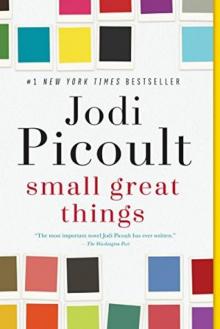 Small Great Things
Small Great Things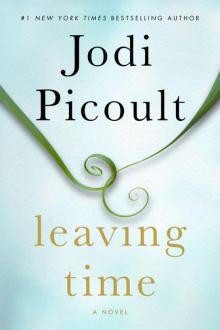 Leaving Time
Leaving Time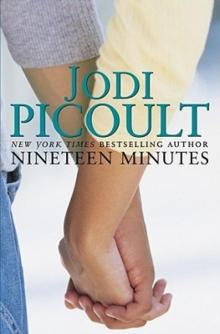 Nineteen Minutes
Nineteen Minutes Larger Than Life
Larger Than Life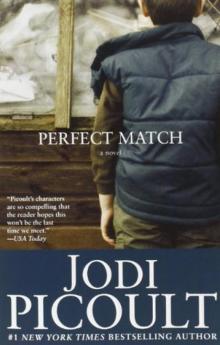 Perfect Match
Perfect Match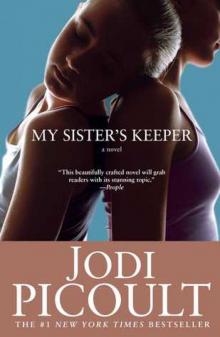 My Sister's Keeper
My Sister's Keeper The Pact
The Pact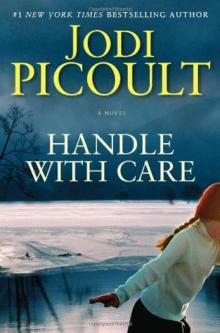 Handle With Care
Handle With Care Songs of the Humpback Whale
Songs of the Humpback Whale Mermaid
Mermaid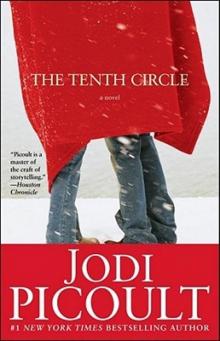 The Tenth Circle
The Tenth Circle The Color War
The Color War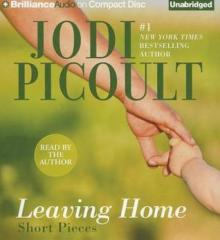 Leaving Home: Short Pieces
Leaving Home: Short Pieces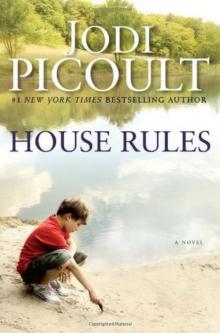 House Rules
House Rules Lone Wolf
Lone Wolf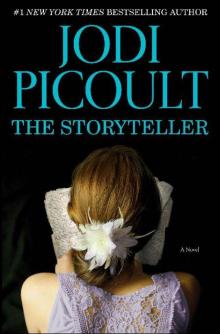 The Storyteller
The Storyteller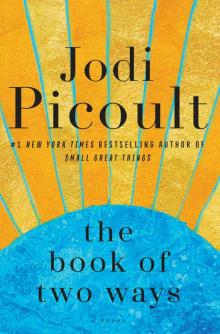 The Book of Two Ways
The Book of Two Ways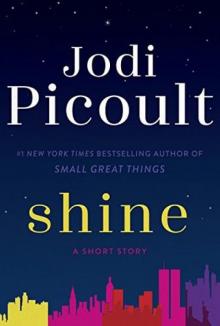 Shine
Shine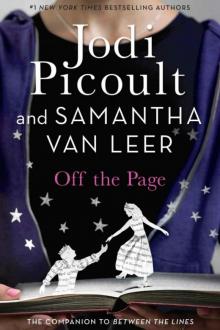 Off the Page
Off the Page Sing You Home
Sing You Home Second Glance: A Novel
Second Glance: A Novel Mercy
Mercy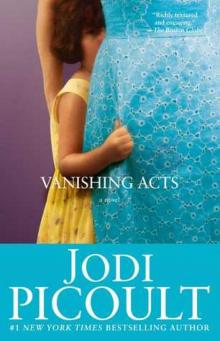 Vanishing Acts
Vanishing Acts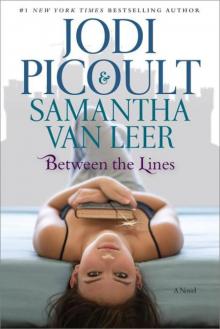 Between the Lines
Between the Lines Plain Truth
Plain Truth Salem Falls
Salem Falls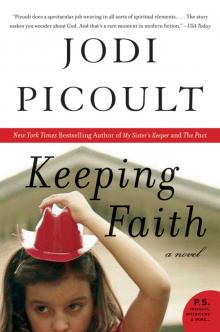 Keeping Faith
Keeping Faith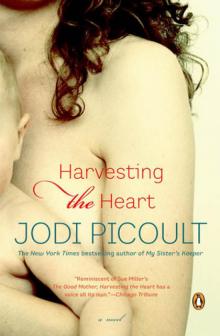 Harvesting the Heart
Harvesting the Heart Change of Heart
Change of Heart Where There's Smoke
Where There's Smoke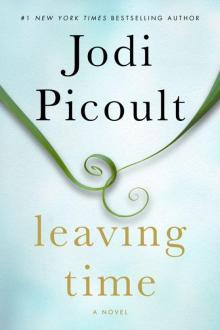 Leaving Time: A Novel
Leaving Time: A Novel Over the Moon
Over the Moon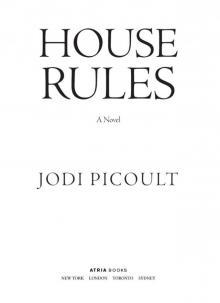 House Rules: A Novel
House Rules: A Novel The Jodi Picoult Collection #2
The Jodi Picoult Collection #2 Leaving Home: Short Pieces (Kindle Single)
Leaving Home: Short Pieces (Kindle Single)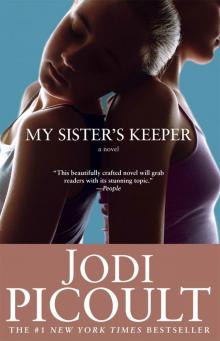 My Sister's Keeper: A Novel
My Sister's Keeper: A Novel![Mermaid [Kindle in Motion] (Kindle Single) Read online](http://i1.bookreadfree.com/i1/04/03/mermaid_kindle_in_motion_kindle_single_preview.jpg) Mermaid [Kindle in Motion] (Kindle Single)
Mermaid [Kindle in Motion] (Kindle Single) The Jodi Picoult Collection #4
The Jodi Picoult Collection #4 Sing You Home: A Novel
Sing You Home: A Novel The Jodi Picoult Collection
The Jodi Picoult Collection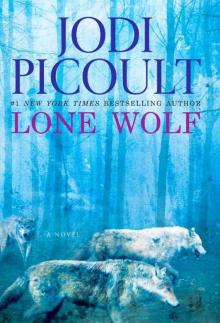 Lone Wolf A Novel
Lone Wolf A Novel Second Glance
Second Glance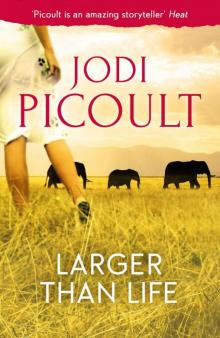 Larger Than Life (Novella)
Larger Than Life (Novella) The Jodi Picoult Collection #3
The Jodi Picoult Collection #3